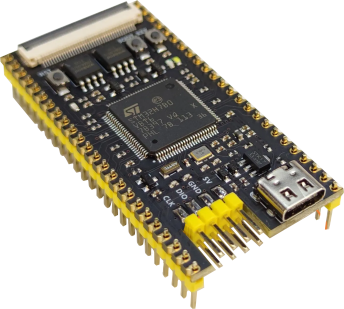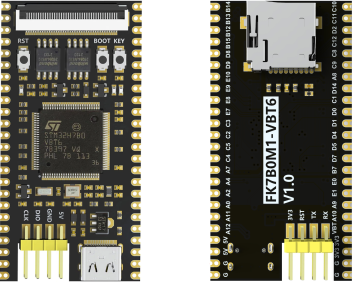FANKE FK7B0M1-VBT6
Overview
The FK7B0M1-VBT6 core board by FANKE Technology Co., Ltd. is an advanced microcontroller platform based on the STMicroelectronics Arm® Cortex®-M7 core STM32H7B0VBT6 microcontroller. This board is an ideal solution for developers looking to create high-performance applications, especially in the field of Human-Machine Interface (HMI), leveraging its robust capabilities and support for sophisticated display and touch technologies.
The FK7B0M1-VBT6 is designed as a reference design for user application development before transitioning to the final product, significantly simplifying the development process. Its wide range of hardware features, including advanced display and touch capabilities, make it exceptionally suitable for HMI applications, allowing for comprehensive evaluation and testing of peripherals and functionalities.

FK7B0M1-VBT6 (Credit: FANKE Technology Co., Ltd)
Hardware
FK7B0M1-VBT6 provides the following hardware components:
STM32H7B6VB in LQFP100 package
ARM 32-bit Cortex-M7 CPU with FPU
280 MHz max CPU frequency
VDD from 1.62 V to 3.6 V
128 KB Flash
~1.4 MB SRAM max (1.18 Mbytes user SRAM + 64 Kbytes ITCM RAM + 128 Kbytes DTCM RAM + 4 Kbytes SRAM in Backup domain)
Main clock: External 25MHz crystal oscillator.
RTC: 32.768kHz crystal oscillator.
32-bit timers(2)
16-bit timers(12)
1 reset button, 1 user button, and 1 BOOT button
1 user LED
External 64-Mbit QSPI (W25Q64) NOR Flash memory.
External 64-Mbit SPI (W25Q64) NOR Flash memory.
USB OTG Full Speed and High Speed(1)
1 micro SD card
1 RGB LCD interface
SWD and serial port accessibility through a pin header
Bring out 39 IO ports
More information about STM32H7B0VB can be found here:
Supported Features
The Zephyr nucleo_h723zg board configuration supports the following hardware features:
Interface |
Controller |
Driver/Component |
|---|---|---|
NVIC |
on-chip |
nested vector interrupt controller |
UART |
on-chip |
serial port |
PINMUX |
on-chip |
pinmux |
GPIO |
on-chip |
gpio |
RNG |
on-chip |
True Random number generator |
Backup SRAM |
on-chip |
Backup SRAM |
Other hardware features are not yet supported on this Zephyr port.
The default configuration per core can be found in the defconfig files:
boards/arm/fk7b0m1-vbt6/fk7b0m1_vbt6_defconfig
Connections and IOs
Available pins:
Nucleo FK7B0M1-VBT6 board has 6 GPIO controllers. These controllers are responsible for pin muxing, input/output, pull-up, etc.

FK7B0M1-VBT6 (Credit: FANKE Technology Co., Ltd)
LED
User LED (blue) = PC1
UART
TX device = USART1 PA9
RX device = USART1 PA10
USB
USB D- = PA11
USB D+ = PA12
System Clock
The FK7B0M1-VBT6 System Clock could be driven by an internal or external oscillator, as well as by the main PLL clock. By default the system clock is driven by the PLL clock at 280MHz, driven by an 25MHz external crystal oscillator.
Serial Port
The Zephyr console output is assigned to UART1. The default communication settings are 115200 8N1.
Programming and Debugging
The FK7B0M1-VBT6 board does not include an on-board debugger. As a result, it requires an external debugger, such as ST-Link, for programming and debugging purposes.
The board provides header pins for the Serial Wire Debug (SWD) interface.
Flashing
To begin, connect the ST-Link Debug Programmer to the FK7B0M1-VBT6 board using the SWD interface. Next, connect the ST-Link to your host computer via a USB port. Once this setup is complete, you can proceed to build and flash your application to the board
Here is an example for the Hello World application.
# From the root of the zephyr repository
west build -b fk7b0m1_vbt6 samples/hello_world
west flash
Run a serial host program to connect with your board:
$ minicom -D /dev/ttyACM0 -b 115200
Then, press the RESET button, you should see the following message:
Hello World! fk7b0m1_vbt6
Debugging
This current Zephyr port does not support debugging.
